Independent record labels provide artists with creative control and personalized marketing strategies while fostering unique sounds. They face challenges such as limited resources and competition from major labels. Approaching these labels effectively requires tailored communication and a clear vision. Understanding their values and practices is essential for successful collaboration.
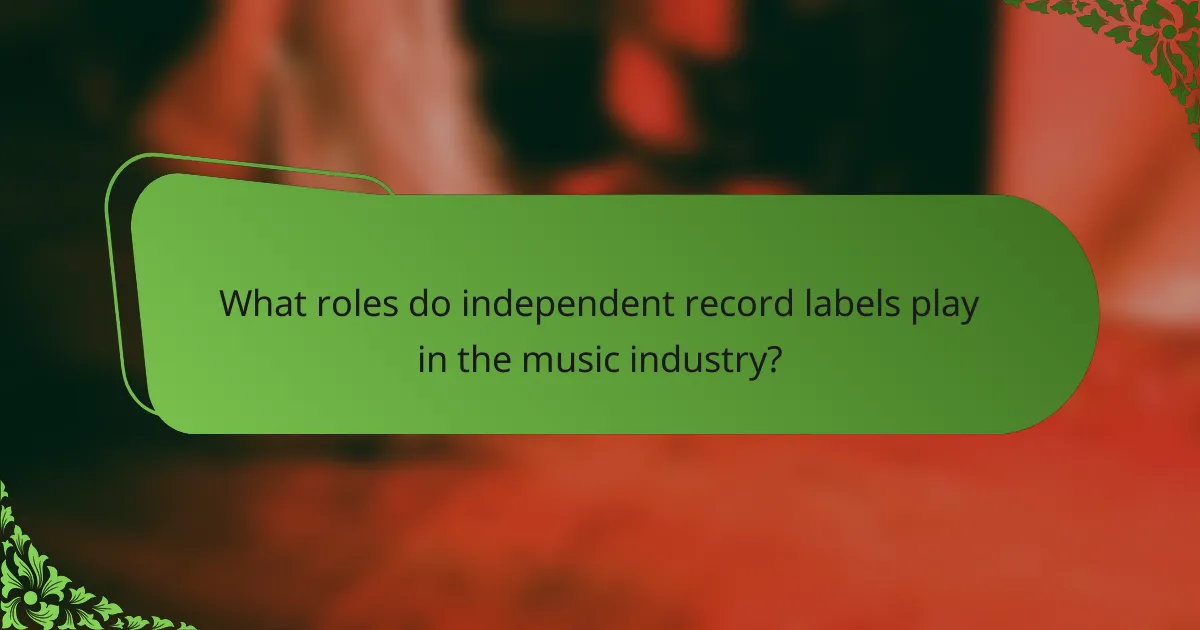
What roles do independent record labels play in the music industry?
Independent record labels play crucial roles in the music industry by fostering artistic freedom, promoting diverse sounds, and supporting emerging artists. They often provide personalized marketing strategies and cultivate direct relationships with fans. Independent labels can also offer unique advantages, such as creative control and lower overhead costs compared to major labels. As a result, they contribute significantly to the music ecosystem, allowing for innovation and variety in musical expression.
How do independent labels differ from major labels?
Independent labels prioritize artistic freedom and niche markets, while major labels focus on mass-market appeal and commercial success. Independent labels often offer more personalized support and creative control to artists, enabling unique sounds and innovative projects. In contrast, major labels provide extensive resources and industry connections but may impose stricter guidelines. The independence of smaller labels allows them to adapt quickly to trends, while major labels benefit from established distribution networks.
What are the key functions of independent record labels?
Independent record labels primarily function to support and promote artists outside of major label systems. They offer creative freedom, personalized marketing strategies, and often a more artist-centric approach.
Key functions include artist development, providing financial support for recording, and facilitating distribution channels. They also focus on niche markets, allowing for diverse music genres to thrive. Additionally, independent labels often foster close relationships with their artists, enhancing collaboration and innovation.
Why are independent labels important for emerging artists?
Independent labels are crucial for emerging artists as they offer personalized support, creative freedom, and access to niche markets. These labels often provide resources that larger labels overlook, allowing artists to develop their unique sound and brand. They foster a close-knit community, enabling collaboration and networking opportunities. Additionally, independent labels typically offer more favorable contract terms, allowing artists to retain a larger share of their earnings.
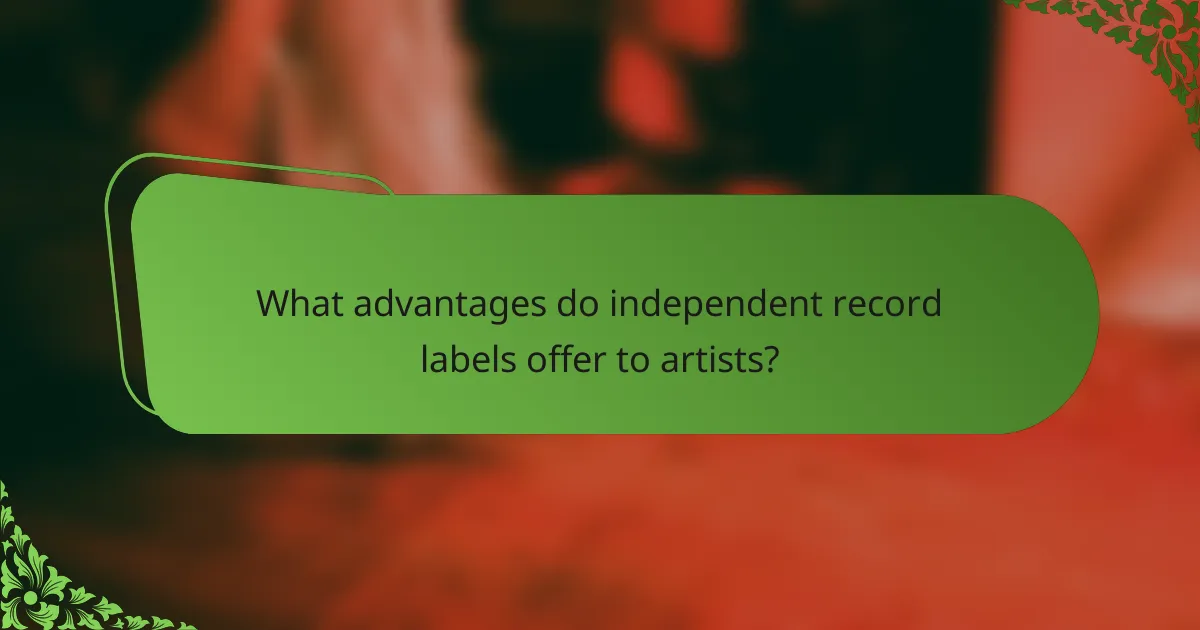
What advantages do independent record labels offer to artists?
Independent record labels offer artists greater creative control, personalized marketing strategies, and higher revenue shares. Artists often benefit from stronger relationships with label staff, leading to tailored support and guidance. Additionally, independent labels typically allow for more artistic freedom, enabling unique sounds and styles to flourish. They often focus on niche markets, which can enhance an artist’s visibility in specific genres.
How do independent labels provide creative freedom?
Independent labels provide creative freedom by allowing artists to maintain control over their music and artistic vision. They typically offer flexible contracts, enabling musicians to experiment without commercial constraints. This autonomy fosters innovation and personal expression, leading to unique sounds that often resonate more authentically with audiences. Additionally, independent labels often prioritize artist development, investing time and resources to nurture talent rather than focusing solely on immediate profitability.
What financial benefits can artists gain from independent labels?
Artists can gain significant financial benefits from independent labels, including higher revenue shares and creative control. Independent labels often offer better royalty rates compared to major labels, allowing artists to retain a larger portion of their earnings. Additionally, these labels frequently provide funding for recording and marketing, which can enhance an artist’s visibility and reach. With fewer bureaucratic constraints, artists also have the opportunity to explore diverse revenue streams, such as merchandise and live performances. Overall, independent labels can empower artists financially while fostering their artistic vision.
How do independent labels support artist development?
Independent labels enhance artist development by providing personalized support, resources, and creative freedom. They often focus on nurturing talent through mentorship, marketing strategies, and financial backing. Additionally, independent labels foster a close-knit community that encourages collaboration and artistic growth. This unique approach contrasts with major labels, which may prioritize commercial success over artist development.
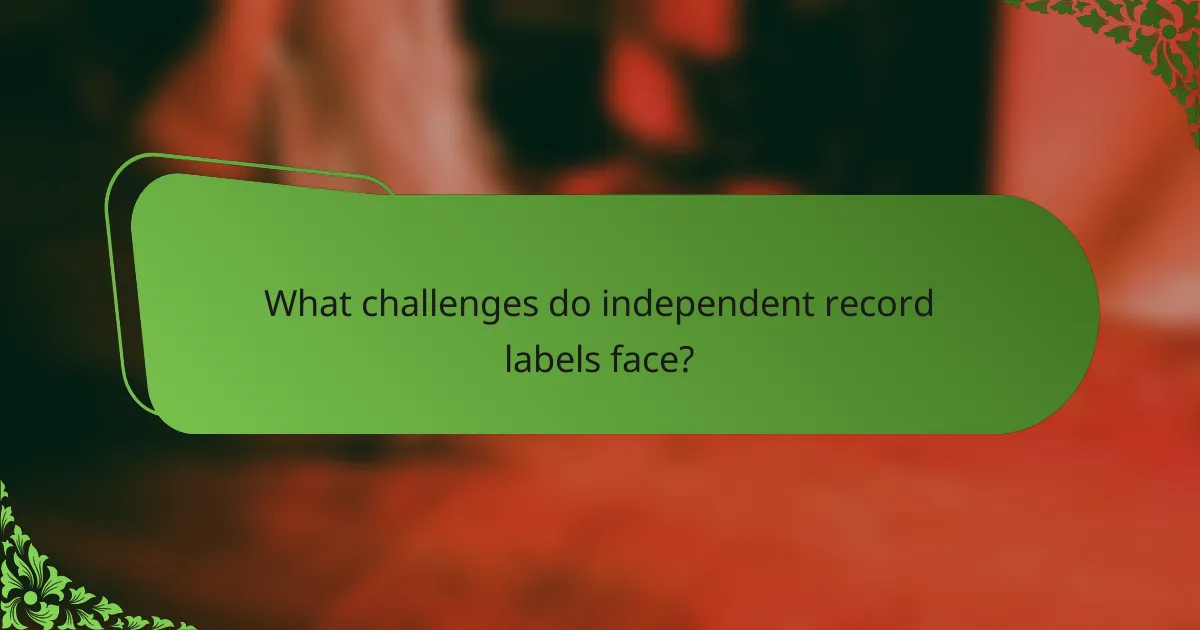
What challenges do independent record labels face?
Independent record labels face significant challenges that impact their operations and growth. Key issues include limited financial resources, competition from major labels, and difficulties in marketing and distribution. Independent labels often struggle to secure funding, which restricts their ability to promote artists effectively. Additionally, navigating a crowded music market dominated by larger entities complicates visibility for independent artists. The reliance on digital platforms for distribution can also present hurdles in reaching target audiences.
How do independent labels navigate distribution challenges?
Independent labels navigate distribution challenges by leveraging digital platforms and building direct relationships with audiences. They often use innovative strategies to bypass traditional channels, ensuring wider reach. Collaborations with independent distributors allow them to maintain control over their music while accessing broader markets. Additionally, they utilize social media for promotion, which enhances visibility without significant costs.
What marketing hurdles do independent labels encounter?
Independent labels face significant marketing hurdles that impact their growth. Limited budgets restrict outreach capabilities, making it challenging to compete with major labels. Additionally, lack of industry connections can hinder access to promotional opportunities. Many independent labels struggle with brand visibility, as they often lack the resources for extensive marketing campaigns. Finally, navigating digital platforms requires expertise, which may not be readily available, further complicating their marketing efforts.
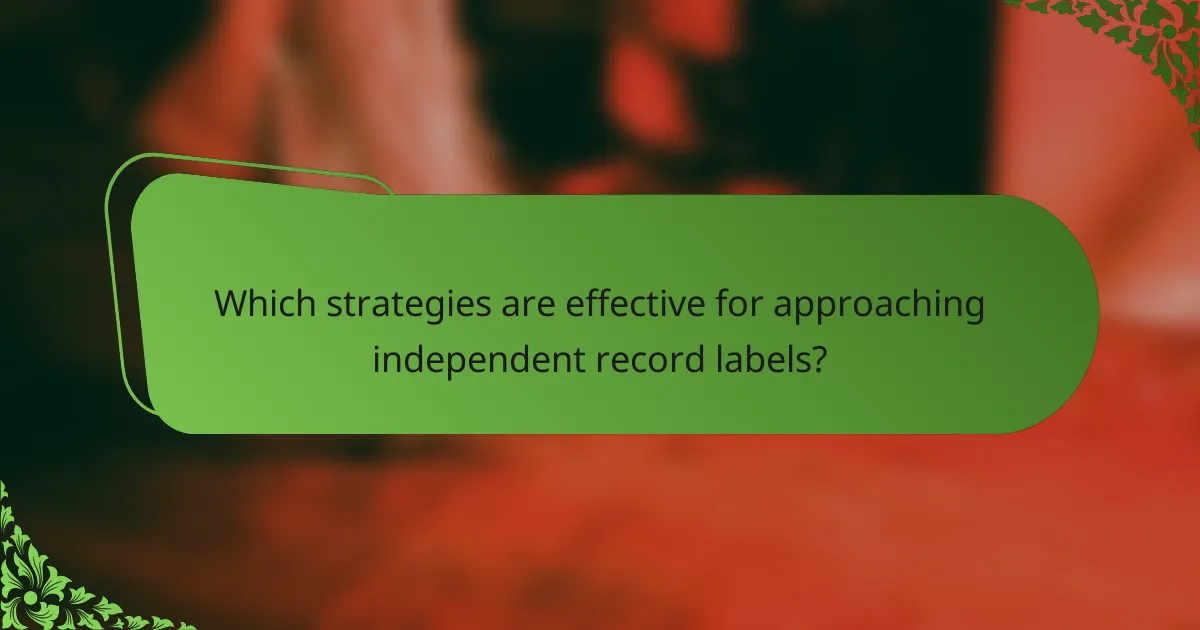
Which strategies are effective for approaching independent record labels?
Effective strategies for approaching independent record labels include personalized communication, showcasing unique talent, and demonstrating a clear vision. Research the label’s roster to tailor your pitch. Highlight your strengths and audience engagement metrics. Follow up respectfully to maintain interest.
What materials should artists prepare before reaching out to labels?
Artists should prepare a professional demo, an engaging bio, and a press kit before reaching out to labels. A demo showcases musical quality and style, while a bio highlights the artist’s background and achievements. A press kit can include photos, social media links, and reviews to enhance credibility. These materials create a compelling presentation that captures label interest.
How can artists effectively pitch their music to independent labels?
Artists can effectively pitch their music to independent labels by crafting personalized and compelling proposals. Focus on showcasing your unique sound and artistic vision. Highlight relevant achievements, such as previous releases or performances, to establish credibility. Research the label’s roster to tailor your pitch, demonstrating alignment with their style. Include a professional demo, a well-written bio, and links to your social media presence. Follow up respectfully to express continued interest without being intrusive.
What networking opportunities exist for connecting with independent labels?
Networking opportunities for connecting with independent labels include attending music industry conferences, participating in local music events, and leveraging social media platforms. These venues allow artists to showcase their work and engage directly with label representatives. Additionally, joining music-related organizations can provide access to exclusive networking events. Engaging in collaborations with other artists can also lead to introductions to label contacts.
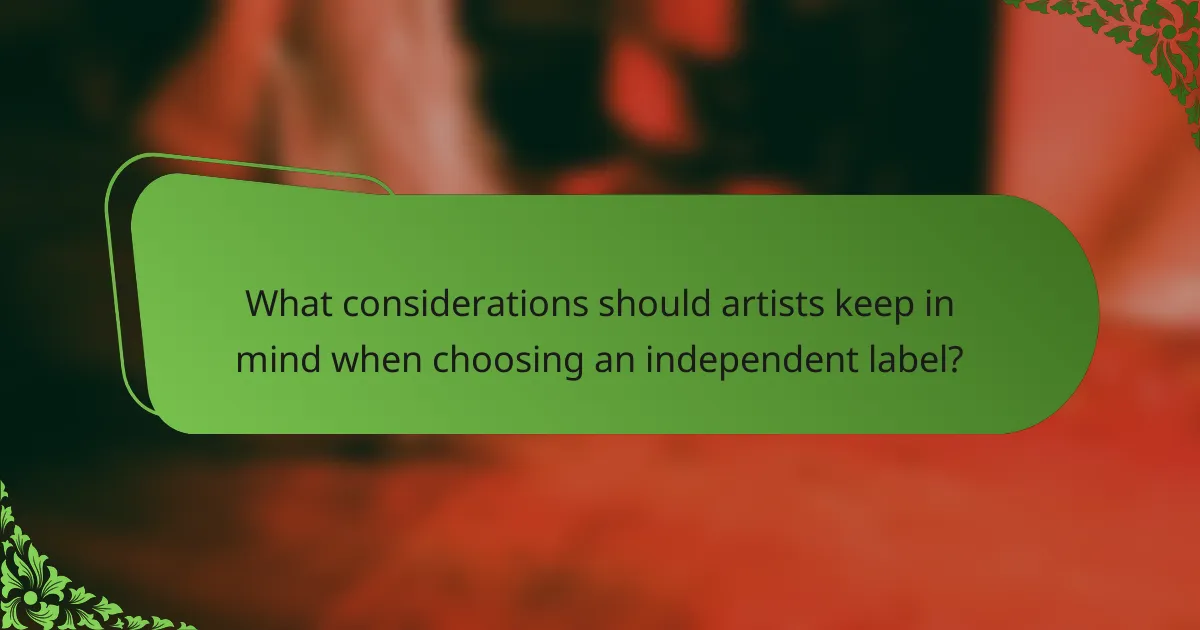
What considerations should artists keep in mind when choosing an independent label?
Artists should prioritize alignment with their values and artistic vision when choosing an independent label. Key considerations include the label’s reputation, distribution capabilities, financial terms, and support for creative control. Researching past artists’ experiences can provide insight into the label’s practices. Additionally, understanding the label’s marketing strategies and audience reach can help artists gauge potential success.
How do label values align with an artist’s vision?
Independent record labels align with an artist’s vision by providing creative freedom and personalized support. These labels prioritize artistic integrity, allowing musicians to explore their unique sound without commercial constraints. They often share a passion for the genre, fostering a collaborative environment that enhances the artist’s creative process. Additionally, independent labels typically offer tailored marketing strategies that resonate with the artist’s identity, ensuring their vision is effectively communicated to the audience.
What unique attributes should artists look for in a label partnership?
Artists should seek labels that prioritize creative freedom, offer personalized marketing support, and have a strong distribution network. Unique attributes include a label’s reputation for artist development and a commitment to transparent financial practices. Additionally, artists should consider labels that provide access to industry connections and opportunities for collaboration. These factors can significantly enhance an artist’s career trajectory and overall satisfaction in the partnership.
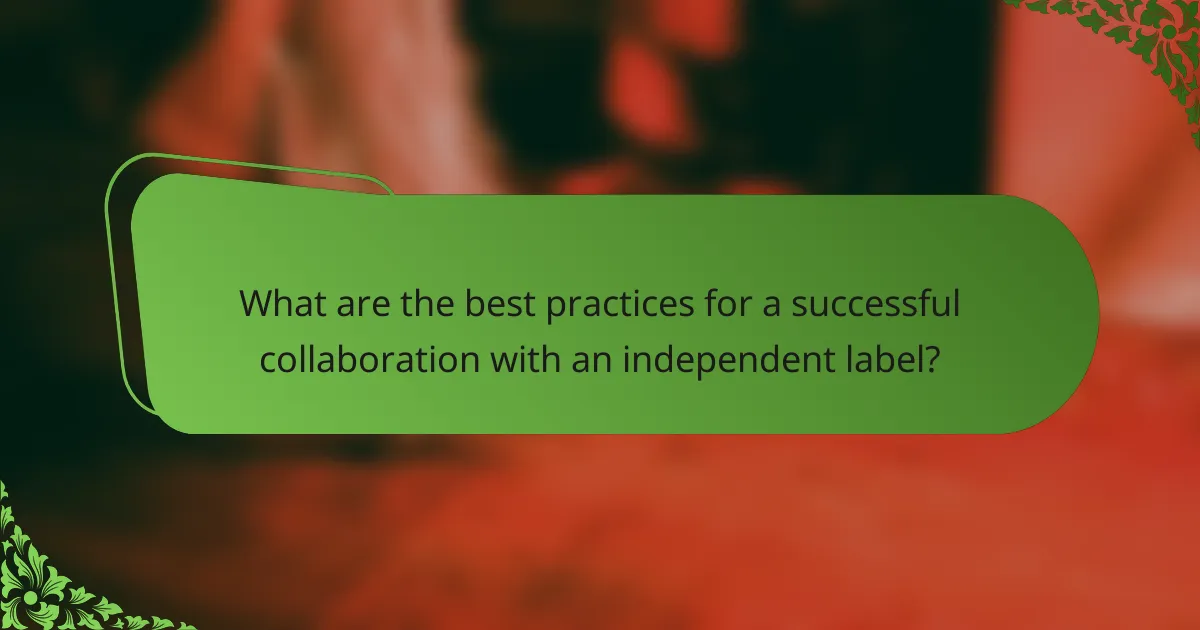
What are the best practices for a successful collaboration with an independent label?
Successful collaboration with an independent label involves clear communication, mutual respect, and shared goals. Establish a strong relationship by being transparent about your artistic vision and expectations.
1. Define objectives: Clearly outline what you hope to achieve from the collaboration.
2. Foster open dialogue: Regularly discuss progress, challenges, and feedback.
3. Respect creative control: Allow the label to influence marketing and promotion strategies.
4. Stay organized: Keep track of deadlines and deliverables to maintain a smooth workflow.
5. Build trust: Honor agreements and commitments to strengthen the partnership.
6. Evaluate performance: Periodically assess the collaboration’s success and make adjustments as needed.
How can artists maintain a strong relationship with their label?
Artists can maintain a strong relationship with their label by communicating openly, setting clear expectations, and collaborating effectively. Regular updates on creative progress foster trust. Understanding the label’s goals and aligning them with personal artistic vision enhances synergy. Engaging in promotional efforts and participating in label events demonstrate commitment. Establishing a feedback loop allows for constructive dialogue, ensuring both parties remain aligned.
What common mistakes should artists avoid when working with independent labels?
Artists should avoid common mistakes like neglecting contracts, failing to communicate effectively, and overlooking marketing. Understanding the role of independent labels can prevent these errors. Many artists underestimate the importance of clear agreements, which can lead to disputes. Additionally, poor communication with label representatives can hinder collaboration. Lastly, artists often ignore marketing strategies, limiting their reach and impact in the industry.
What expert tips can enhance the artist-label collaboration experience?
Effective artist-label collaboration can be enhanced through clear communication, mutual respect, and shared goals. Establishing open dialogue fosters trust and allows for creative input from both parties. Regular feedback sessions can refine the partnership and ensure alignment on vision. Setting measurable objectives helps track progress and success. Additionally, understanding each other’s strengths and weaknesses can lead to more effective collaboration.


